
American singer and actor Elvis Aaron Presley (January 8, 1935 – August 16, 1977), widely recognized as The King of Rock-N-Roll, is the celebrity whose military service is probably best known. He enlisted in the US army at the peak of his career, in 1958, when he was already world-famous and had wide success as a rockabilly and rock-n-roll singer also encompassing other genres, including gospel, blues, ballads, and pop music.
Elvis Presley: Birth of the Star

Elvis Aaron Presley was born on January 8, 1935, in Tupelo, Mississippi. He was a twin, but his brother was stillborn. Elvis had a strong bond with his parents, especially with his mother Gladys. His father Vernon was doing odd jobs, and the family often depended on the goodwill of neighbors or government food support. Elvis was an average student at best, but impressed the teachers with his singing. One of the teachers encouraged him to enter a singing contest, which turned out to be Elvis’s first public appearance at the age of 10. He sang Old Shep, a country song, and placed fifth. A few months later Gladys bought Elvis his first guitar and by the time Elvis entered the seventh grade, he was bringing that guitar to school with him most every day.
The family relocated to Memphis, Tennessee in 1948, when Elvis was 13 years old. Elvis never received formal music training, he couldn’t read or write music, and he studied and played by ear. While at school, Elvis and four other friends formed a loose musical collective and played frequently at their public housing complex. Presley’s earliest musical influence came from gospel, and later from country, blues and rhythm and blues. He loved and was inspired by many of the local African-American musicians. However, he was quite shy and didn’t perform outside of his housing complex. It all changed when he overcame his fear and competed in the annual Minstrel show in April 1953. “It was amazing how popular he became at school after that”, the singer recalled later. When he graduated in June of the same year, he knew he wanted to make music his future.
After graduating from high school, Elvis took odd jobs working as a movie theater usher and a truck driver. At the same time he began singing locally as “The Hillbilly Cat“, and his music career began there in 1954, with the recording at Sun Records with producer Sam Phillips, who wanted to bring the sound of African-American music to a wider audience.
In 1955, Presley began to develop a following with fans who were drawn by his unusual musical style, provocative hips, and good looks.
A year later RCA Victor acquired his contract. It was a deal arranged by Colonel Tom Parker, who would manage Elvis Presley for over two decades. Presley’s single “Heartbreak Hotel” was released in 1956 and became a number-one hit in the United States. Within a year, RCA would sell ten million Presley singles. He also signed a movie contract with Paramount Pictures, and became a popular guest on a number of television variety shows.
And then, to the huge surprise of his fans, in 1958 at the peak of his career, Elvis Presley enlisted in the army. Couldn’t he get away from the military service?
Elvis Presley Enlists in the Army
It is often said that Elvis Presley was never planning to dodge his military duty. Under the draft system of that time, all young American men of good health were required to register for the U.S. Selective Service System at 18. They were expected to be available to serve in the military for two years of active duty and then four years in the reserves. Just 11 days after his 18th birthday, Elvis Presley fulfilled his patriotic responsibility and filed his draft card on January 19, 1953. He subsequently went for a pre-induction physical on January 4, 1957, to determine his status. “I’m kind of proud of it,” Presley said when asked about his decision, according to The Arizona Daily Star. “It’s a duty I’ve got to fill and I’m going to do it.”
Elvis was quite worried that the two-year break could negatively influence his career, but his manager Colonel Tom Parker had a different view. Elvis’s rock-n-roll music outraged a lot of Americans and created a lot of negative publicity. Military service was an opportunity to shine a spotlight on Elvis’s “All-American values,” in contrast to the “vulgarity” and “animalism” ascribed to his music by the Catholic Church and many other critics.
On the other hand, National Archives Prologue Magazine states that Elvis’s induction created a public relations headache. Bereft fans wrote to the President, the draft board, and anyone else who they thought could bring their idol back home. The following letter to First Lady Mamie Eisenhower was forwarded to the Army:
Dear Mamie,
Will you please please be so sweet and kind as to ask Ike to please bring Elvis Presley back to us from the Army. We need him in our entertainment world to make us all laugh. The theatres need him to help fill their many empty seats. . . . Also did you know Elvis has been paying $500,000 in income taxes. We feel the huge taxes he has been paying could help our defense effort far more than his stay in the Army. Please ask Ike to bring Elvis back to us soon.
Various branches of the armed services offered Elvis appealing jobs. The Navy suggested creating an “Elvis Presley company” composed of his friends from Memphis; the Air Force wanted to use him as a recruiting model, and the Army offered to have him only play concerts for the troops.
Elvis Presley had a chance to enlist in Special Services to entertain the troops and live in priority housing, but his manager Colonel Tom Parker didn’t enjoy the idea of Presley entertaining “uncle Sam” for free. He persuaded Elvis that serving as a regular soldier would change the view of Americans of him for the better and that he would return a bigger star. Indeed, many parents, teachers, and religious leaders welcomed his draft. His service earned him the respect of many of his fellow soldiers and people back home who previously had viewed him in a negative light.
At the press conference organized by the army before he left West Germany, Presley was asked about his decision to serve as a regular soldier instead of as part of the service club. He said, “I was in a funny position. Actually, that’s the only way it could be. People were expecting me to mess up, to goof up in one way or another. They thought I couldn’t take it and so forth, and I was determined to go to any limits to prove otherwise, not only to the people who were wondering, but to myself”
The Draft, Deferment, and Duty: Elvis Presley’s Journey From Paramount to the Army
Presley was originally scheduled to be inducted on January 20, 1958. However, due to commitments at Paramount and the filming schedule of his latest film, King Creole, Presley had to personally write to the Memphis Draft Board to request a deferment.
According to the Graceland, Museum of Elvis Presley in Memphis, TN, Elvis was inducted into the United States Army at the Memphis Draft Board on March 24, 1958. The next day, at Fort Chaffee, Arkansas, he received his indoctrination exam and traditional, military, G.I. haircut in front of 55 media photographers.
Elvis received basic training at Fort Hood, Texas, and was stationed there for six months. He was assigned to Company A of the Third Armored Division’s 1st Medium Tank Battalion. Publicly he enjoyed the training, but his friends reported that he didn’t like it at all, was very homesick, and was very worried that his career would come to an end.
On his first leave in summer, he had his recording session, the last one before his discharge in 1960. His second leave was an emergency one – his mother Gladys died of cirrhosis in August. It hit him hard, as he was very close to his mother.
Elvis in Uniform: A Soldier’s Odyssey in West Germany
From October 1 Elvis Presley was stationed in Friedberg, West Germany, for 18 months, being assigned to the 1st Medium Tank Battalion, 32nd Armor, 3rd Armored Division.
In his post-service press-conference, Elvis said about his time in West Germany, “I had quite a few interesting experiences: Slept out in the snow, ate through rations. I suppose the biggest thing is that I did make it. I tried to play it straight like everybody else. I made a lot of friends that I wouldn’t have made otherwise. All in all, it’s been a pretty good experience.”
A May 1959 memorandum from the assistant deputy chief of staff for personnel puts a positive spin on Presley’s presence in the military, suggesting that the Army’s impartial treatment and Presley’s dutiful service would help to inspire other young men: “Many teenagers who look up to and emulate Private First Class Presley will, to a varied degree, follow his example in the performance of their military service.”
Beyond the Barracks: Elvis Presley’s Extraordinary G.I. Experience in West Germany
A lot of official sources say that Elvis Presley served as an ordinary G.I., but in reality, his life in West Germany was far from the ordinary. He was already an international star and could afford much more than other privates with their small salaries. First, Elvis lived off-base in Bad Nauheim with his father, his grandmother, and some friends from Memphis. Then, he hired a car and driver to chauffeur him back and forth between his home and the base each day – at least until he got his own Mercedes and a sporty BMW 507.
He still gave interviews, held press-conferences, took karate lessons in Paris, and enjoyed the attention of his European fans. The German Way & More says that his army assignments were often influenced by his fame. The one time Elvis was put on guard duty at Ray Barracks, he was so mobbed by fans, the “guard” had to be rescued! That was the end of his guard duty.
When he was not away on maneuvers, very often he would come home for lunch. Sometimes he would sign autographs in front of the house before coming in. In the evening, at 7:30 p.m. he would go out and sign autographs for fans until 8:00 p.m.
One hundred members of his division also got a taste of Elvis-mania when they participated as extras in the film G.I. Blues, made during his stay in Germany.
It was in West Germany, where he met his future wife, Priscilla Ann Beaulieu at his home party. He was 24, and she was 14, still at school. After an eight-year courtship he married her, and by who later had his only child, Lisa Marie Presley.
On January 20, 1960, Elvis Presly was promoted to Sergeant, received his sergeant’s stripes on February 11, and less than a month later, on March 5, 1960, was officially discharged from active duty.
In his biography, Graceland Museum emphasizes that Elvis served his country just like any other G.I., with none of the special privileges his celebrity status might have afforded him; he was a model soldier, earning the lasting respect of his fellow soldiers and the public at large.
In 2018, Graceland celebrated the 60th anniversary of Elvis Presley’s service with the exhibition of Private Presley.
Elvis Presley’s Career Surge and Ongoing Stardom Post-Service
Elvis’s stint in the military didn’t stall his career; quite the opposite, it breathed new life into his stardom. His manager, Colonel Tom Parker, orchestrated a strategic plan to keep the public engaged during Elvis’s army service, ensuring a steady stream of material to prevent him from fading from memory. Surprisingly, this approach not only maintained but heightened his popularity. Elvis even garnered admiration from older generations who respected his military commitment. Colonel Parker’s savvy plan not only proved intelligent but also propelled Presley’s fame to new heights.
After his return from military service in 1960, Presley continued to perform rock and roll. Most of the 1960s, Elvis devoted to making Hollywood films and soundtrack albums. He didn’t perform live for seven years at all, but in 1968 he returned to the stage, had a series of very successful concerts in Las Vegas and then very profitable tours.
The United States Junior Chamber of Commerce (the Jaycees) named Elvis One of the Ten Outstanding Young Men of the Nation for 1970. This award has been given since 1938 and has honored men of achievement in all areas of endeavor – sports, government, science, medicine, entertainment, etc. The award ceremony on January 16, 1971, was one of Elvis’ proudest moments.
Elvis Presley’s Collaborations with Fellow Celebrities
Elvis Presley, being a cultural icon and a music legend, had numerous collaborations and interactions with other celebrities throughout his career. Here are some of his collaborations:
Frank Sinatra: Elvis and Frank Sinatra shared the stage in a memorable television special titled “Elvis Presley ’68 Comeback Special” in 1968. They engaged in a casual yet iconic duet, showcasing the camaraderie between two giants of the music industry.
Jerry Lee Lewis, Johnny Cash, and Carl Perkins: Elvis Presley, along with fellow rock and roll pioneers Jerry Lee Lewis, Johnny Cash, and Carl Perkins, participated in the famous recording session known as the “Million Dollar Quartet” in 1956. The impromptu jam session at Sun Studio in Memphis became legendary.
Ann-Margret: Elvis co-starred with Ann-Margret in the film “Viva Las Vegas” (1964). Their on-screen chemistry was not only evident in the movie but also in real life, sparking rumors of a romance.
Chuck Berry: Elvis and Chuck Berry, two influential figures in rock and roll, did not have direct collaborations but were part of the same music landscape during the genre’s formative years.
The Beatles: While there’s no direct collaboration between Elvis and The Beatles, their paths crossed during the filming of “Elvis Presley ’68 Comeback Special.” The Beatles acknowledged Elvis as a major influence on their music.
Nancy Sinatra: Elvis collaborated with Nancy Sinatra on the song “You’re The Boss” in 1967. The duet was part of Sinatra’s television special, “Movin’ with Nancy.”
B.B. King: Elvis and B.B. King, both influential in their respective genres, met on several occasions. While there isn’t a recorded collaboration, their interactions highlight the crossover appeal of their music.
Elvis Presley’s Unlikely Encounter with President Nixon
Elvis Presley had a notable relationship with President Richard Nixon, which culminated in a meeting at the White House on December 21, 1970. The story behind this meeting is intriguing and has become a part of pop culture history.
Elvis, concerned about the influence of counterculture movements and drug use, reached out to the Nixon administration expressing his desire to assist in promoting patriotism and countering the anti-establishment sentiment. He believed that by associating himself with the President, he could positively impact the nation.
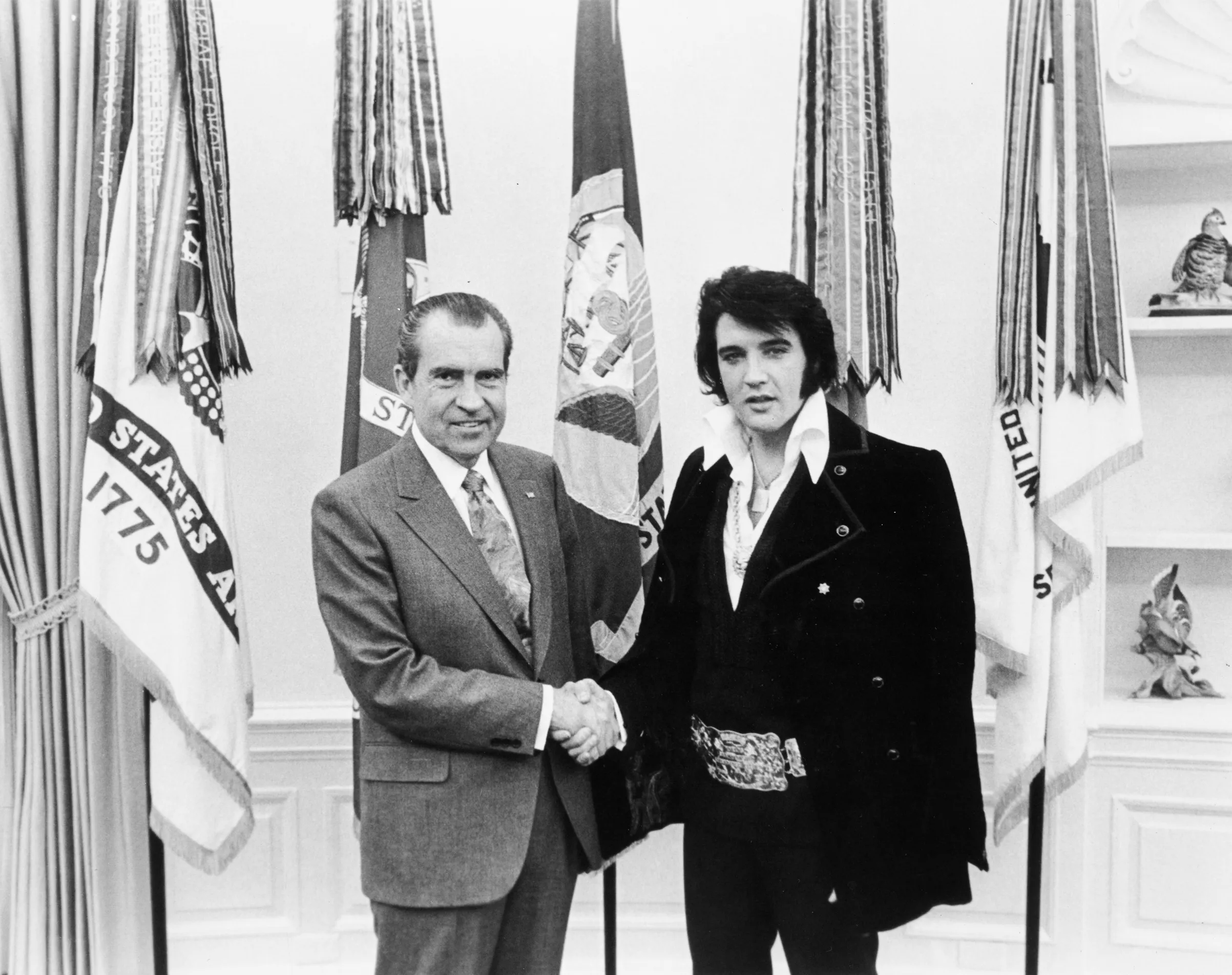
To facilitate this meeting, Elvis wrote a letter to President Nixon on December 1, 1970, expressing his concerns and offering his assistance. In the letter, Elvis identified himself as a “drug addict” reforming his ways and expressing his love for his country. He proposed that he be made a “Federal Agent at Large” to help in the government’s fight against drug abuse.
President Nixon, intrigued by the unusual request, agreed to a meeting. On December 21, 1970, Elvis Presley visited the White House, where he handed the President a World War II-era Colt .45 pistol as a gift. The meeting was captured in a now-famous photograph of the two shaking hands in the Oval Office.
While Elvis’s request to become a “Federal Agent at Large” was not officially granted, the meeting remains a unique chapter in the history of celebrity interactions with the U.S. presidency. The documents related to this encounter, including Elvis’s letter and the President’s staff notes, are preserved in the National Archives.
Unusual Facts about Elves Presley
Elvis Presley was a multifaceted and fascinating personality. Here are some unusual facts about him:
Karate Enthusiast: Elvis was a black belt in karate. He took up martial arts during his military service in Germany and continued his training after returning to the United States. He even incorporated karate moves into his stage performances.
Prescription Drug Collection: Elvis had a fascination with law enforcement and collected police badges. He was known for carrying a large collection of badges and even had a special affinity for federal agents. His interest in law enforcement was reflected in some of his movie roles.
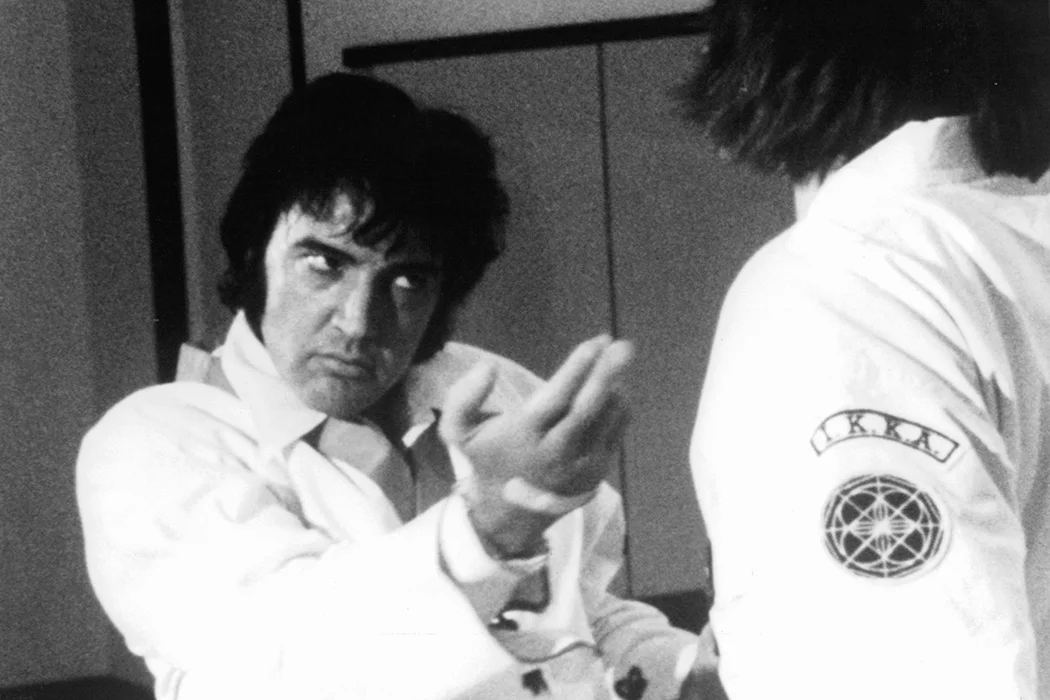
Generous Gifter: Elvis was known for his generosity. He frequently gave away cars, jewelry, and other expensive gifts to friends, family, and even strangers. It wasn’t uncommon for him to buy Cadillacs and hand out keys to people he liked.
Private Jet Purchases: Elvis owned two private jets named “Lisa Marie” and “Hound Dog II.” The Lisa Marie, a Convair 880, was customized to include a master bedroom, conference room, and gold-plated seat belts. It showcased his extravagant lifestyle.
Graceland’s Jungle Room: Graceland, Elvis’s famous mansion, has a room known as the “Jungle Room” due to its unconventional decor. The room features green shag carpeting on the floor and ceiling, along with wood-paneled walls, giving it a unique and tropical ambiance.
Deep Love for Peanut Butter and Banana Sandwiches: One of Elvis’s favorite snacks was a sandwich made with peanut butter, sliced bananas, and bacon. Legend has it that he once flew from Graceland to Denver just to satisfy a craving for this unusual combination.
Religious Beliefs: Elvis was a devout Christian, and his faith played a significant role in his life. He recorded numerous religious songs and gospel albums.
Deputy Sheriff Title: Elvis was made an honorary deputy sheriff in several counties across the United States. He had a genuine interest in law enforcement and, in some cases, even participated in police activities.
Presley’s Natural Blond Hair: Elvis was born a natural blond but started dying his hair black in his late teens, creating the iconic jet-black hair look that became synonymous with his image.
Presley’s Commercial Success: He is one of the best-selling solo artists in the history of recorded music. His albums, such as “Elvis Presley,” “Elvis,” and “Blue Hawaii,” achieved significant commercial success.
Elvis Presley: Beyond the Mic – A Symphony of Generosity and Philanthropy
Elvis Presley’s philanthropic efforts extended beyond his direct involvement in specific organizations. His acts of kindness and generosity often occurred on a personal level, showcasing his compassion for individuals facing hardship. Some additional aspects of his charitable and philanthropic impact include:
March of Dimes: Elvis was actively involved with the March of Dimes, a non-profit organization that works to improve the health of mothers and babies. He participated in the organization’s campaigns and events, contributing both his time and resources.
Cancer Research: Elvis supported cancer research initiatives. He often made personal donations to various cancer charities and hospitals.
Local Communities: Elvis was known for his generosity toward people in need within his local community. He frequently made significant donations to various charitable causes and organizations in Memphis and other areas.
Memphis Federation of Musicians Local 71: In 1961, Elvis performed a benefit concert for the Memphis Federation of Musicians Local 71. The proceeds from the concert were used to help musicians in need.
St. Jude Children’s Research Hospital: After his passing, Elvis Presley’s ex-wife, Priscilla Presley, continued his philanthropic legacy. She played a key role in supporting St. Jude Children’s Research Hospital in Memphis. The hospital was founded by entertainer Danny Thomas, and it treats children with cancer and other catastrophic diseases. The Presley family has been actively involved in fundraising efforts for St. Jude. Elvis’s charitable endeavors reflected his commitment to giving back to the community and making a positive impact on the lives of those in need. His legacy continues through the ongoing efforts of organizations that benefit from his contributions and the charitable work of the Presley family.
Anonymous Donations: Elvis was known for making anonymous donations to various charities and individuals in need. His desire to help others was often done quietly and without seeking public recognition.
Gifts and Financial Assistance: Elvis was generous in providing financial assistance and gifts to friends, family members, and strangers who were struggling financially. His willingness to help those close to him and even strangers in distress highlighted his compassionate nature.
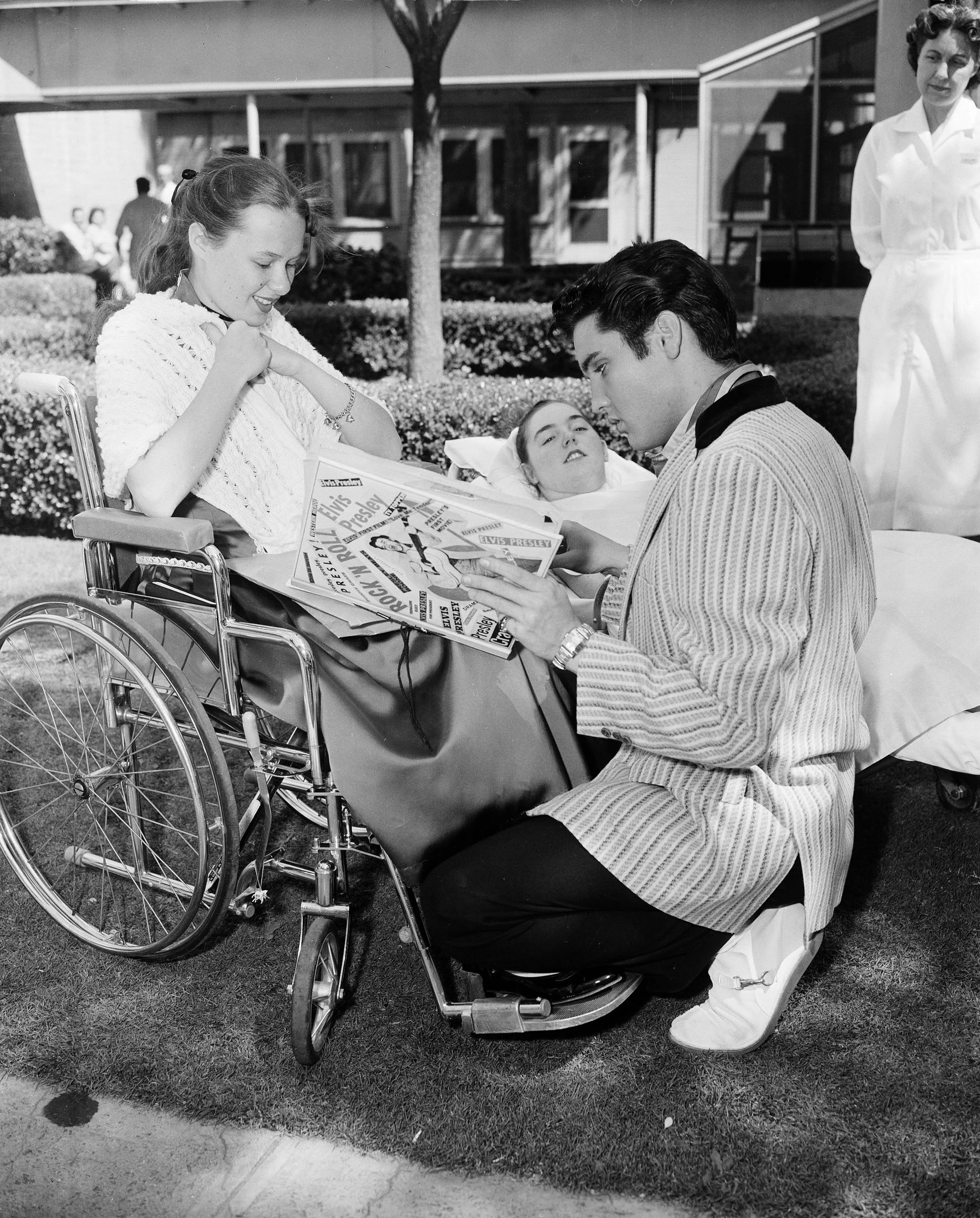
Support for Education: Elvis supported educational initiatives and scholarship programs. He believed in the importance of education and contributed to initiatives that aimed to provide opportunities for aspiring students.
Veterans and Military Causes: Given his own military service, Elvis had a soft spot for veterans and military causes. He made donations to organizations supporting veterans and their families.
Disaster Relief Efforts: Elvis contributed to disaster relief efforts in the aftermath of natural disasters. His contributions were aimed at providing aid to those affected by hurricanes, floods, and other calamities. While Elvis Presley’s philanthropic activities were often private, they left a lasting impact on individuals and communities. His commitment to helping others reflected a genuine desire to make a positive difference in the lives of those facing various challenges. The cumulative effect of his charitable work contributes to the enduring legacy of the man behind the music.
Elvis Presley Notable Achievements
Elvis Presley, known as the “King of Rock ‘n’ Roll,” received various awards and nominations throughout his career. However, it’s important to note that most of these accolades were related to his contributions to the music industry, and not specifically for his military service. Here are some highlights of Elvis Presley’s awards and nominations:
- Released 24 studio albums
- Recorded 17 soundtrack albums (original material)
- Starred in 33 films
- The total number of his original master recordings has been variously calculated as 665 and 711.
- During his “concert years” from 1969 to 1977, Elvis gave nearly 1,100 concert performances.
- Sold over 500 million records worldwide
- Holds the records for most songs charting in Billboard‘s top 40: 115
- Holds the record for the most albums charting in the Billboard 200: 129
- He holds the records for most gold albums: 10
- Holds the record for most time spent at number one on the Billboard 200: 67 weeks
Elvis won three Grammy Awards in his lifetime, all for Gospel recordings:
- Best Sacred Performance for his album “How Great Thou Art” (1967).
- Best Inspirational Performance for his album “He Touched Me” (1972).
- Best Inspirational Performance for his live Memphis concert recording of “How Great Thou Art” (1974).
- Lifetime Achievement Award: Elvis Presley received the Grammy Lifetime Achievement Award in 1971.
- Elvis was inducted into the Rock and Roll Hall of Fame in 1986. He received the Grammy Hall of Fame Award multiple times for various recordings.
Regarding military honors, Elvis served in the United States Army from 1958 to 1960. He received the standard service medals and badges for his time in the military, including the Good Conduct Medal, the Marksman Badge with a Rifle Bar, and the Army Expert Marksmanship Badge.
It’s essential to appreciate both aspects of Elvis Presley’s life—his groundbreaking contributions to music and his service in the military.
Elvis Presley’s Death
Tragically, years of prescription drug abuse and unhealthy eating habits severely compromised Elvis’s health, and he died in 1977 at his Graceland estate at the age of 42.
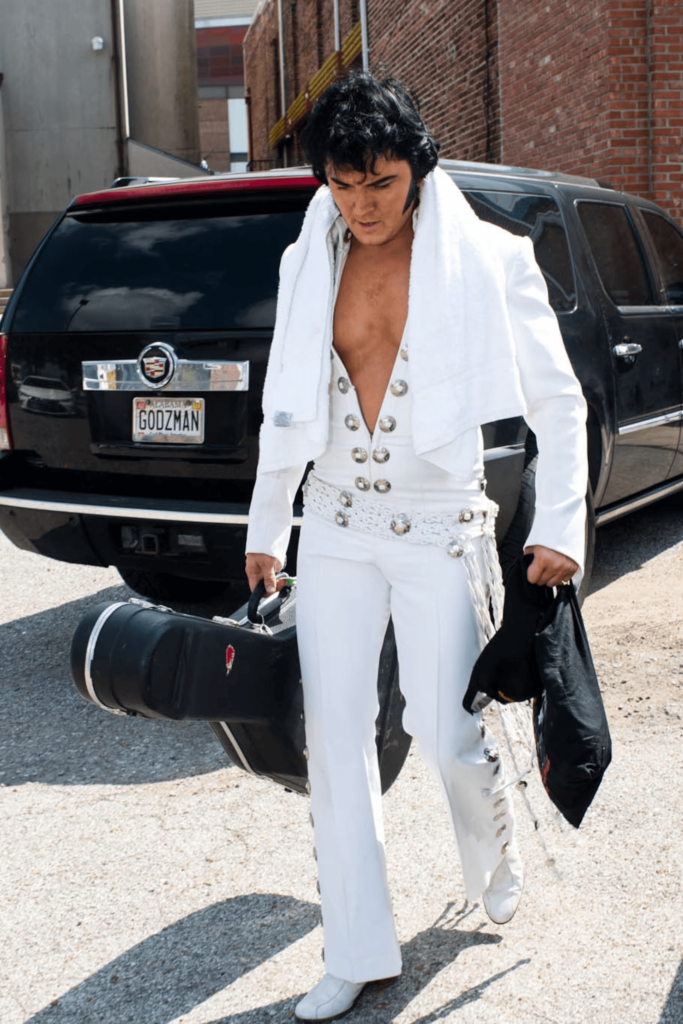
While Elvis had a short life, his legacy continues to live on. Not only did Elvis completely turn the music world upside down with his unique sound and high-energy performances, his music had an immense influence on other musicians, who would go on to further shape the sound of rock-n-roll. TogetherWeServed celebrates Elvis’s musical journey and everlasting cultural legacy, as well as his military service.
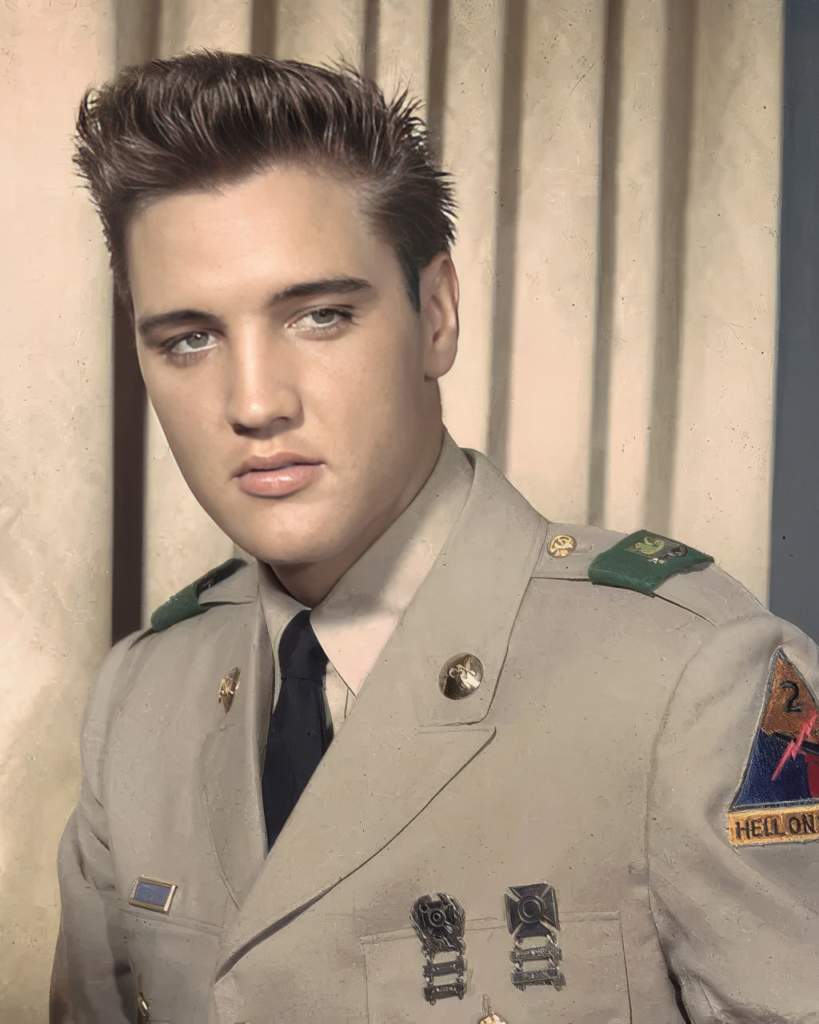
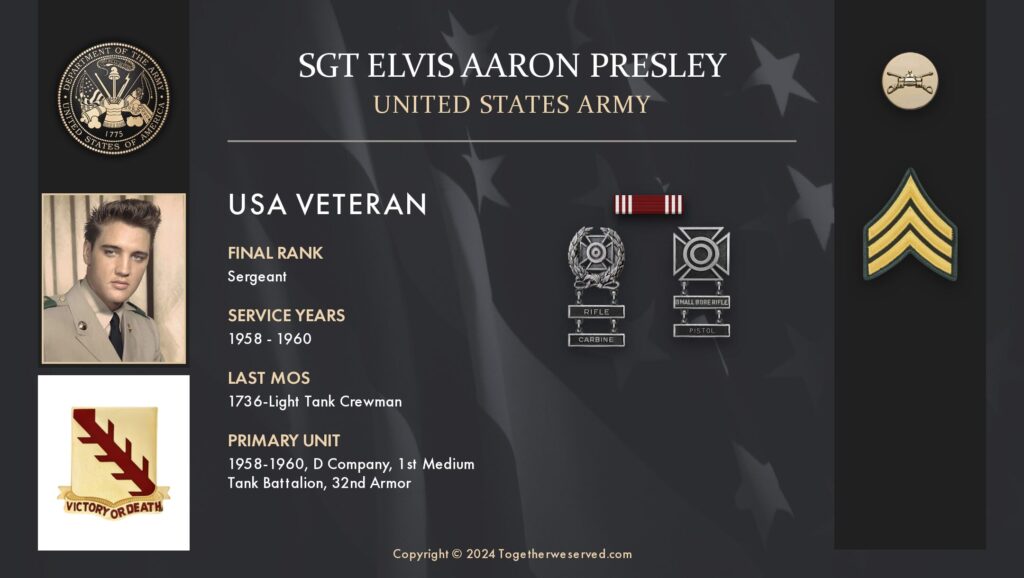
Want to Learn About Famous Military Veterans?
If you enjoyed learning about Elvis Presley’s service in the military, we invite you to read the stories of other remarkable celebrities who served on our blog. In addition to our profiles of celebrities who served, we share military book reviews, veterans’ service reflections, famous military units and more on the TogetherWeServed.com blog. If you are a veteran, find your military buddies, view historic boot camp photos, build a printable military service plaque, and more on TogetherWeServed.com today.
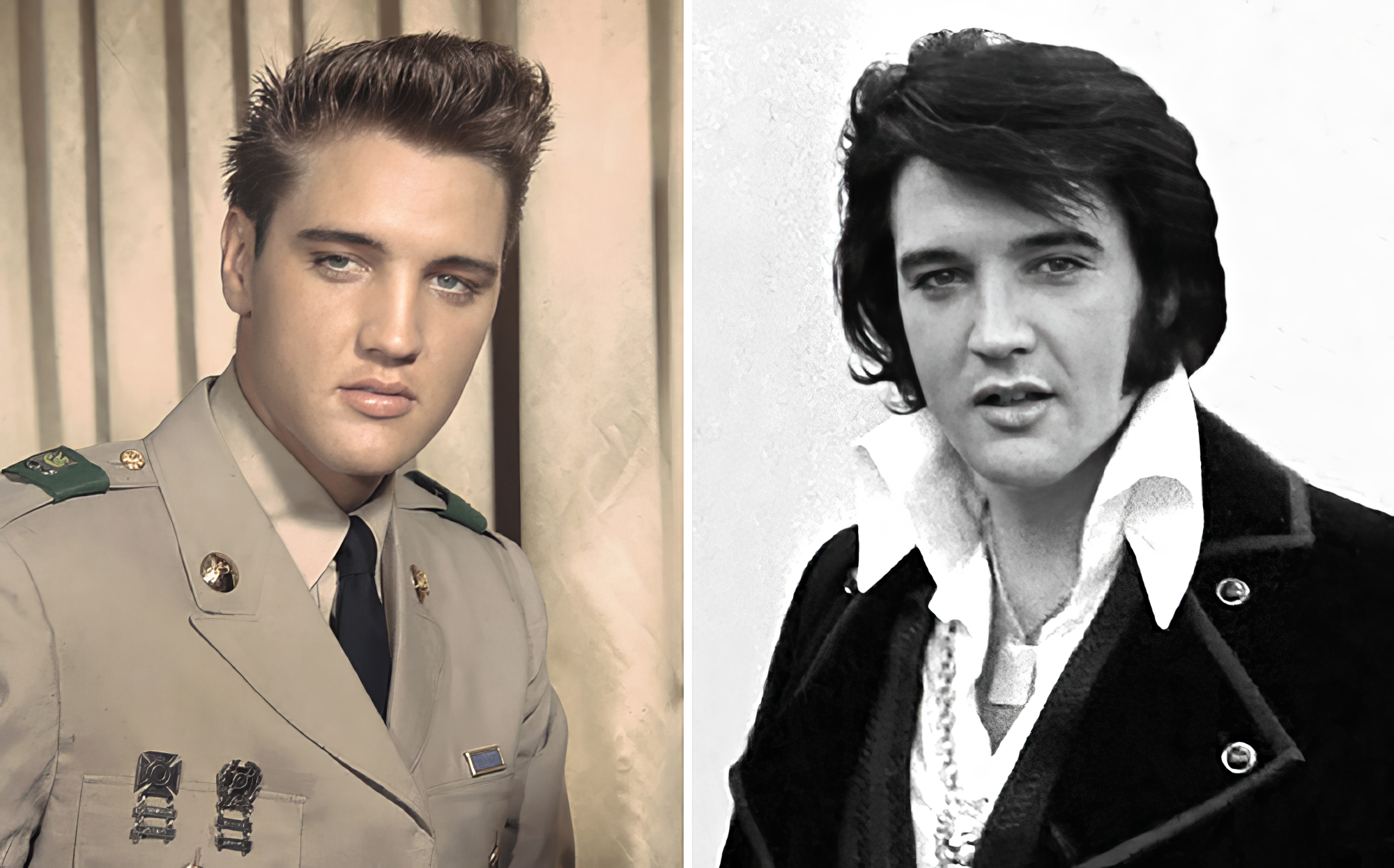
Always wondered how he was allowed to keep all that hair!
I was proud to serve in the USAF, 3years 10 months and 21 days.
right at the very top of this article, you show two photos, left in uniform, right in civvies. just fyi, you “flopped” the uniform photo… his medal and badges are on the exact wrong sides. every veteran will spot this visual error, just like i did. this is no minor photo error, it is a major error in fact that deserves correction.